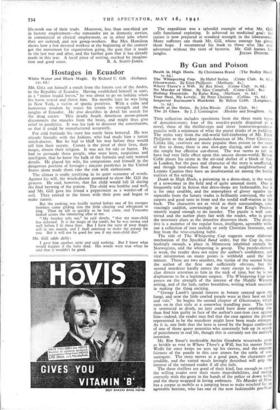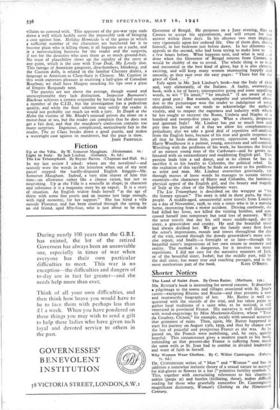By Gun and Poison
7s. 6d.)
Death at the Helm. By John Rhode. (Crime Club. 8s.)
THIS collection includes specimens from the three main types of detective-story; four of the murder-puzzle disguised as a
novel, three of the thriller-type and three honest-to-goodness puzzles with a minimum of what the purist thinks of as padding. The styles vary from the old-world half-timbering of Mr. Eden
Phillpotts to the ardent pseudo-American of .Mr. Peter Cheyney. Unlike life, revolvers are more popular than poison in the ratio of five to three, there is one shot-gun slaying, and one use of the simple but effective cut-throat. The war seems as yet to have had very little effect upon this uncosy dream-world; Belton Cobb places his crime in the air-raid shelter of a block of flats in London but the pace and character of the story is unaffected, and though land-mines float about in the neighbourhood of Lerruny Caution they have an insubstantial air among the brittle realities of his setting.
Death in High Heels, a poisoning in a dress-shop, is the work of a newcomer in the field and of quite unusual merit. One is frequently told in fiction that dress-shops are fashionable, but it is for once credible, and the atmosphere of glossy squalor in- separable from the luxury trades is brilliantly conveyed, the soft carpets and good taste in front and the sordid staff-warren at the back. The characters are as vivid as their surroundings, con- vincingly caddish, convincingly in fear of the King's Proctor, smartly stupid enough to do murder. The puzzle is well con- trived and the author plays fair with the reader, who is given the necessary clues as the detective discovers them. The detec- tive is a member of the regular force, intelligent, agreeably with- out a collection of rare orchids or early Christian literature, and free from the wise-cracking habit.
The title of The Whispering Cup suggests some elaborate mechanism of the Speckled Band order, but the Cup is, mis- leadingly enough, a place in Minnesota inhabited entirely by Norwegians, and the whispering is gossip. The puzzle-element is weak, the reader does not enjoy the author's confidence, and vital information on many points is withheld until the last Minute. There are two murders, the victim of the second being the author of the first and sufficiently obvious, but the second murderer hardly enters the story except to confess. A clue directs attention to him in the nick of time, but he is too diaphanous to be a legitimate suspect. The Whispering Cup just passes on the strength of the interest of the Middle Western setting, and of the lush, rather breathless, writing which succeeds in making the thing exciting.
- "George Lamb's special interest in botany centred upon the fungi, and now the little cowled people were at their best on hill and vale." So begins the second chapter of Ghostwater, which runs on in that style at a somewhat trundling pace. The hero is sentenced to death, no jury could have done anything else than find him guilty in face of the author's cast-iron case against him—indeed, the reader may feel that the case against the person represented to be the murderer might have been made stronger. As it is, one feels that the hero is saved by the bogus confession of one of those queer neurotics who constantly bob up in search of punishment in real life, though this is certainly not the author's intention.
Mr. Rex Stout's intolerable Archie Goodwin wisecracks away as briskly as ever in Where There's a Will, but his master Nero Wolfe for once keeps no aces up his sleeves, and the extreme fairness of the puzzle in this case atones for the rattle of wit- surrogate. The story moves at a good pace, the characters are credible, and the varied meals lovingly described will grip the interest of the rationed reader if all else fails.
The three thrillers are good of their kind, fast enough to carry the willing reader over their many improbabilities, and ending correctly with the goats in the hands of the police or down wells, and the sheep wrapped in loving embraces. No Murder of Mine has a corpse as mobile as a jumping bean to make mischief for an agreeable heroine, who has one of the now fashionable pro-Nazi villains to contend with. This appeaser of the pre-war type ends down a well which luckily saves the impossible task of bringing a case against him. Holiday Homicide is of the genus in which a sufficient number of the characters are butchered for it to become plain who is killing them; it all happens on a yacht, and is a nerve-racking business for the reader and the suspects, if not for the detective who uses them as so much ground-bait. No trace of plausibility slows up the rapidity of the story at any point, which is the case with Your Deal, My Lovely also. This farrago of American gangsters, dive-bombers, blitzkrieg, and the Caution dolls, is related in the familiar Cheyney dialect, a language as American as Chop-Suey is Chinese. Mr. Caution in this work expresses pleasure at receiving a half-glass of Canadian Bourbon; we shall have Maigret smacking his lips over a glass of Empire Burgundy next.
The puzzles are not above the average, though sound and unexceptionable they lack distinction. Inspector Burmann's Blackout achieves a certain originality by having for chief suspect a member of the C.I.D., but the investigation has a pedestrian quality, and while the final solution may satisfy the reader it would not probably cut much ice with a jury. In Death at the Helm the victims of Mr. Rhode's unusual poison die alone on a motor-boat at sea, but the reader can complain that he does not get a fair deal, and that the murderer's confession contains too many surprises. Ingenious, complicated, meticulously fair to the reader, The 21 Clues breaks down a good puzzle, and makes a watertight case against its murderers, but the pace is slow.
JOHN FAIRFIELD.



























 Previous page
Previous page